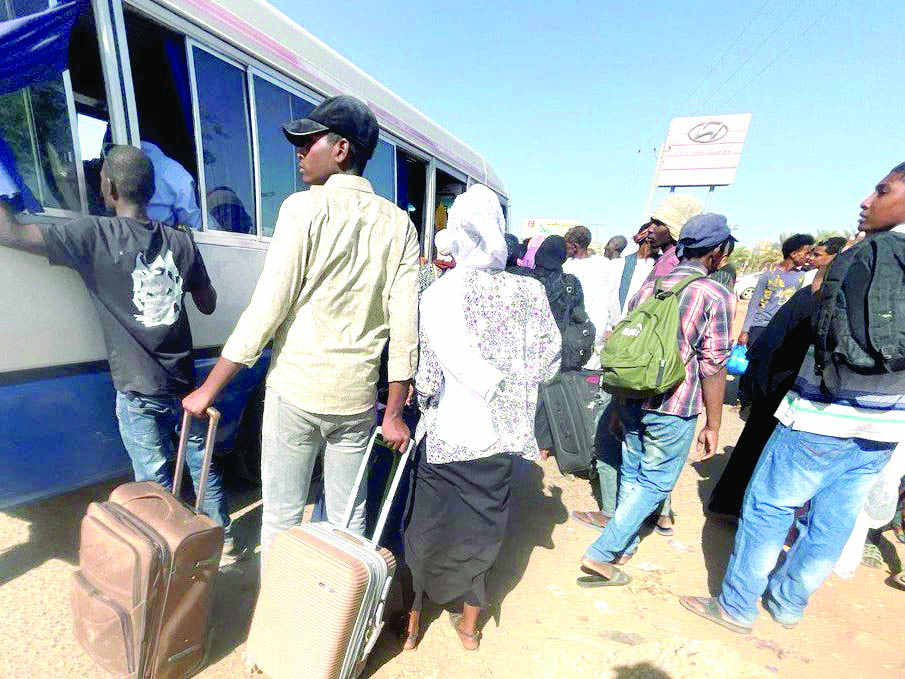Kenyan students holed in Sudan appeal for help

Hundreds of Kenyan students in the war-torn Sudan are still stuck and have called on the Kenyan government to help repatriate them.
Many students who spoke to People Daily yesterday complained they were living under very harsh conditions, adding that they were fearing for their lives.
“Some of us are under scholarship and we are not in a position to sustain ourselves like the first group which left the country to Kenya,” said a student.
They called on the Kenyan embassy in Sudan to address their plight as most of them are still holed up in the war-torn country, awaiting assistance.
According to the students, most of them at the International University of Africa in Khartoum, only Kenyan students have been left in the school after all other countries have evacuated theirs.
They said their efforts to reach out the embassy in Sudan have proved futile.
Evacuees arrive
The first group of evacuees from Sudan arrived in Nairobi aboard a military aircraft on Monday last week.
The group comprised 19 Kenyans, 19 Somalis and one Saudi Arabian national who all travelled by road to South Sudan where they boarded the military aircraft.
They were received by Defence Cabinet Secretary Aden Duale at the Jomo Kenyatta International Airport (JKIA).
Duale commended them for making the long journey to Southern Sudan and thanked the teams involved in facilitating their evacuation.
According to Duale, more evacuees will be airlifted to Nairobi in the coming days by a team of military officials who are leading the exercise in collaboration with Foreign Affairs officials.
He said the government has already identified 3,000 Kenyans in Sudan and has urged those in need of evacuation to register their names, locations and passport numbers on emergency hotlines so that necessary arrangements can be made.
“The Government is committed to ensuring the safe return of Kenyans from Sudan. I know there is a lot of concern about Kenyans still in Sudan,” said Duale.
“We are fully committed to evacuating everyone who has registered for evacuation. Please be patient; we are operating in a very delicate situation that requires a lot of precision,” added the CS.
Sudan is in crisis after fighting broke out between the local army – the Sudanese Armed Forces – and the Rapid Support Forces (RSF), who are both fighting for control of the country.
The fighting broke out in the capital Khartoum last week but clashes have been reported across the country, with at least 427 people reportedly killed and thousands displaced.
Impacted flow
Meanwhile, the violence in Sudan has impacted the free flow of goods in the country leading to an insufficient food supply amidst a worsening battle between two army generals.
The United Nations recently warned of dire shortages of food, water, medicine and fuels especially in Khartoum and the neighboring surroundings.
Thousands of residents have fled the chaos but the remaining majority are now facing inadequate food supply with prices skyrocketing in a country that was already in dire situation before the violence began.
“We say to Hemedti, oh brother, war is a loss for the Sudanese people. Everything has become expensive. And to our brother Burhan, stop this war and find us a radical solution to this war, or else Sudan will completely collapse, and all Sudanese will be displaced. Everyone left and fled. There was no need for all of these problems. We were all countrymen living together. There was no need,” said Barir Hammad, a construction worker.
The fighting has killed at least 459 people and wounded more than 4,000, according to UN agencies.
A total of 14 hospitals have been shelled since fighting erupted, as the remaining people scramble for the few resources.
“We are worried about the prices and worried about where to go. The problem is that the danger comes to us. It is we, civilians who are suffering, we’re living in these conditions, and we can barely make a living. Anything we sell, we’re living off of it. No one is stealing, no one is looting, we just want to work to feed our children,” said Akj Waw Akwani, a construction worker from South Sudan.
Additional reporting by Xinhua










